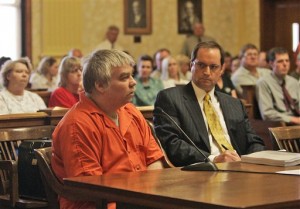Steven Avery lawyers help start non-profit to reform use of forensic science
By: Erika Strebel, [email protected]//October 19, 2018//
Steven Avery lawyers help start non-profit to reform use of forensic science
By: Erika Strebel, [email protected]//October 19, 2018//

A University of Wisconsin Law School professor and Steven Avery’s former lawyers have begun a non-profit foundation dedicated to reforming how forensic science is used in the criminal-justice system.
Avery and his nephew Brendan Dassey were convicted in 2005 in the slaying of the Wisconsin photographer Teresa Halbach. Both are serving life sentences for that killing. They were the subject of a Netflix series called “Making a Murderer.”
The UW Law Professor Keith Findley, Madison attorney Dean Strang and Brookfield attorney Jerry Buting have been working on the Center for Integrity in Forensic Sciences for the past year. This week, the center’s website went live.
The Center for Integrity in Forensic Sciences will be used to fight corruption in crime labs and ensure that valid forensic evidence is being used in court.
“In most states, including Wisconsin, judges are supposed to be the gatekeepers who keep out bogus, improper science from the courtrooms,” Buting said. “The reality is that a lot of people who become lawyers, frankly, aren’t that good at science. For some of them, that’s why they go into law. They hate math and science. And then they become judges and they’re no better at understanding science…”
Part of the motivation Findley, Strang and Buting had to form the Center for Integrity in Forensic Science came from the recent dissolution of the National Commission on Forensic Science. The commission, a federal advisory board composed of various participants in the criminal justice system, was charged with finding ways to improve standards for the use of forensic evidence.
“We realized that this is something that needed a private non-profit to focus on it,” said Buting. “After ‘Making a Murderer’ came out, Dean and I suddenly had this platform … where people were listening.”
The center will be holding its first symposium, titled “Where’s the Science in Forensic Science?,” on Nov. 15 at the St. Louis, Missouri-based Washington University School of Law.
The speakers enlisted for the symposium includes the Washington Post criminal justice reporter Radley Balko and New York attorney Peter Neufeld, a founder of the Innocence Project.
Next fall, the center will also begin a new clinical program at the UW Law School. The program will pair law students with graduate students in the sciences. It will also involve a partnership with UW-Madison’s Wisconsin Institute for Discovery, which is a research institute dedicated to developing new approaches to science through collaborations.
Buting said the non-profit organization’s work is not limited to Wisconsin and that he expects it to become an international project that pulls in work from scientists around the world.
“It’s important for both the defense and the prosecution and justice as a whole,” Buting said. “And the public’s faith in our justice system depends on reliable science.” Follow @erikastrebel
Legal News
- Former law enforcement praise state’s response brief in Steven Avery case
- Eric Toney announces re-election bid for Fond du Lac County District Attorney
- Former Wisconsin Democratic Rep. Peter Barca announces new bid for Congress
- Republicans file lawsuit challenging Evers’s partial vetoes to literacy bill
- More human remains believed those of missing woman wash up on Milwaukee Co. beach
- Vice President Harris returning to Wisconsin for third visit this year
- Wisconsin joins Feds, dozens of states to hold airlines accountable for bad behavior
- Trump ahead of Biden in new Marquette poll
- Bankruptcy court approves Milwaukee Marriott Downtown ‘business as usual’ motion
- New Crime Gun Intelligence Center to launch in Chicago
- Arrest warrant proposed for Minocqua Brewing owner who filed Lawsuit against Town of Minocqua
- Wisconsin Supreme Court justices question how much power Legislature should have
WLJ People
- Power 30 Personal Injury Attorneys – Russell Nicolet
- Power 30 Personal Injury Attorneys – Benjamin Nicolet
- Power 30 Personal Injury Attorneys – Dustin T. Woehl
- Power 30 Personal Injury Attorneys – Katherine Metzger
- Power 30 Personal Injury Attorneys – Joseph Ryan
- Power 30 Personal Injury Attorneys – James M. Ryan
- Power 30 Personal Injury Attorneys – Dana Wachs
- Power 30 Personal Injury Attorneys – Mark L. Thomsen
- Power 30 Personal Injury Attorneys – Matthew Lein
- Power 30 Personal Injury Attorneys – Jeffrey A. Pitman
- Power 30 Personal Injury Attorneys – William Pemberton
- Power 30 Personal Injury Attorneys – Howard S. Sicula











